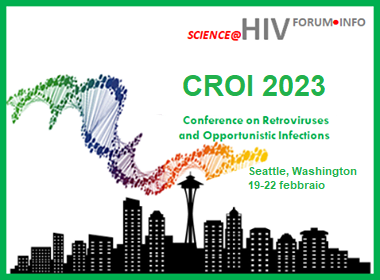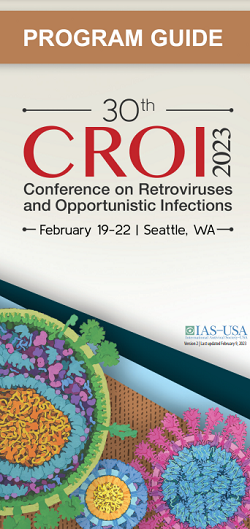
Tra meno di due settimane, torna l'annuale appuntamento del CROI. Torna prevalentemente in presenza, a Seattle dal 19 al 22 febbraio, dopo essere stato virtuale negli anni peggiori della pandemia da Covid.
Quest'anno è il 30° e l'anniversario verrà ricordato nella sessione d'apertura nel pomeriggio di domenica 19 in due presentazioni:
- CROI AT 30: PROGRESS IN HIV THROUGH THE LENS OF CROI, con il ricordo di ricerche passate e la menzione delle sfide che ancora devono essere affrontate;
- CROI: A 30-YEAR CHRONICLE OF HIV/AIDS RESEARCH PROGRESS, in cui il CROI onora la carriera di Anthony Fauci, che è appena andato in pensione e avrà l'occasione di offrire la propria personale prospettiva sulla scienza dell'HIV/AIDS dagli esordi ad oggi.
Il programma completo sarà pubblicato la settimana prossima e allora ci sarà modo di vederne alcuni dettagli. Quella che segue è una panoramica molto parziale, basata sul programma preliminare e sui criteri che tradizionalmente mi hanno portata a scegliere di parlare di certe ricerche, tralasciandone altre altrettanto importanti (HIV e non altri virus o batteri, anche se quest'anno SARS-CoV-2 continua ovviamente ad avere una parte molto rilevante negli interessi del congresso, HBV ha soppiantato HCV, TB resiste e fa il suo ingresso MPOX; ricerca su nuovi farmaci e possibili cure invece che patogenesi e vecchi e nuovi disturbi; terapia invece che prevenzione; adulti invece che bambini).
Il congresso si apre con il solito WORKSHOP FOR NEW INVESTIGATORS AND TRAINEES, che dall'anno scorso è intitolato alla memoria di Scott Hammer. Seguire queste presentazioni è molto utile, perché sono relativamente semplici e permettono di avere un'idea generale dei temi del CROI. Ne segnalo in particolare due:
- ADVANCES IN HIV TREATMENT STRATEGIES, tenuta da Monica Gandhi, University of California San Francisco;
- ADVANCES IN HIV CURE, che torna ad essere tenuta da John Mellors, University of Pittsburgh.
La BERNARD FIELDS LECTURE quest'anno è tenuta da Alan S. Perelson, Los Alamos National Laboratory, e dedicata a MODELING THE DYNAMICS OF HIV INFECTION: ESTABLISHING PARADIGMS FOR TREATMENT AND CURE.
Martedì 21 ci sarà l'importante sessione plenaria curata da Janet Siliciano, Johns Hopkins University School of Medicine, e dedicata a HIV RESERVOIRS: OBSTACLES TO A CURE (un altro dei temi che ricorrono ogni anno al CROI), cui corrisponderà una sessione di abstract orali dallo stesso titolo, moderata da Katharine Bar, University of Pennsylvania, e Linos Vandekerckhove, HIV Cure Research Center, Ghent University.
Sempre martedì, è stata introdotta all'ultimo momento una sessione speciale dedicata alla recente débâcle del vaccino MOSAICO. Due le presentazioni:
- OVERVIEW OF THE MOSAICO HIV VACCINE TRIAL - Susan P. Buchbinder, San Francisco Department of Public Health;
- HIV VACCINE DEVELOPMENT POST-MOSAICO - Lawrence Corey, Fred Hutchinson Cancer Research Center.
Mercoledì, oltre a temi importanti di patogenesi (IMMUNOPATHOGENESIS AND VACCINES, NEUROPATHOGENESIS AND NEUROLOGIC COMPLICATIONS OF HIV AND SARS-COV-2, CARDIO-METABOLIC COMPLICATIONS OF HIV), una discussione su CELLULAR IMMUNE CONTROL OF HIV, moderata da Marcus Altfeld, Leibniz Institute for Virology, Hamburg e un affascinate simposio su THE VIRUSES THEY ARE A CHANGING: HOW THE IMMUNE SYSTEM RESPONDS.
Per la prima volta arriva al CROI il devastante problema della disinformazione e della comunicazione scientifica (era ora, eh?), con una discussione moderata da Jonathan Mermin, CDC, e Jon Cohen, Science - SCIENCE COMMUNICATION IN THE AGE OF MISINFORMATION:
- WHAT CAN I DO? THE CHALLENGE OF HEALTH MISINFORMATION ONLINE - Emily Vraga, University of Minnesota;
- COUNTERING VACCINE AND HEALTH MIS AND DISINFORMATION: AN EVIDENCE-BASED APPROACH - Scott Ratzan, City University of New York;
- WHAT’S FUELING THE SPREAD OF MISINFORMATION: LOOKING BEYOND FAKE FACTS - Heidi Larson, London School of Hygiene & Tropical Medicine, Brussels.
E speriamo che gli scienziati che si muovono in rete abbiano imparato qualcosa dai disastri che hanno combinato negli ultimi anni.
Appena sarà pubblicato il programma completo, riprenderò il thread.
Un'ultima nota: non ho capito se tornerà la bella consuetudine del CROI di rendere pubblici i webcast subito dopo la conclusione delle rispettive sessioni, oppure se i materiali del congresso saranno disponibili solo per gli iscritti. Nel primo caso, cercherò di seguire le presentazioni orali e di aggiornare i thread esistenti delle ricerche o crearne di nuovi. Nel secondo, mi comporterò mestamente come negli ultimi anni.

